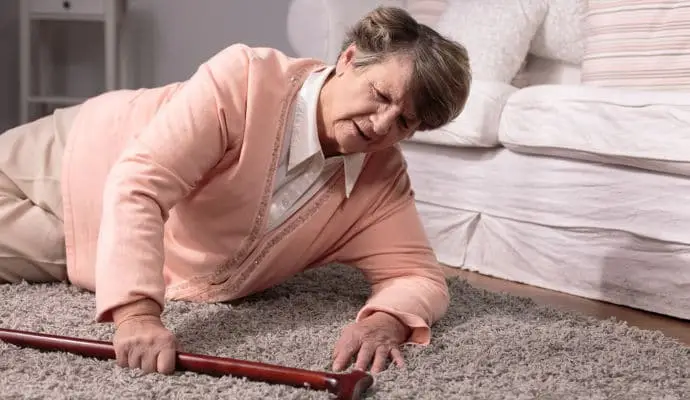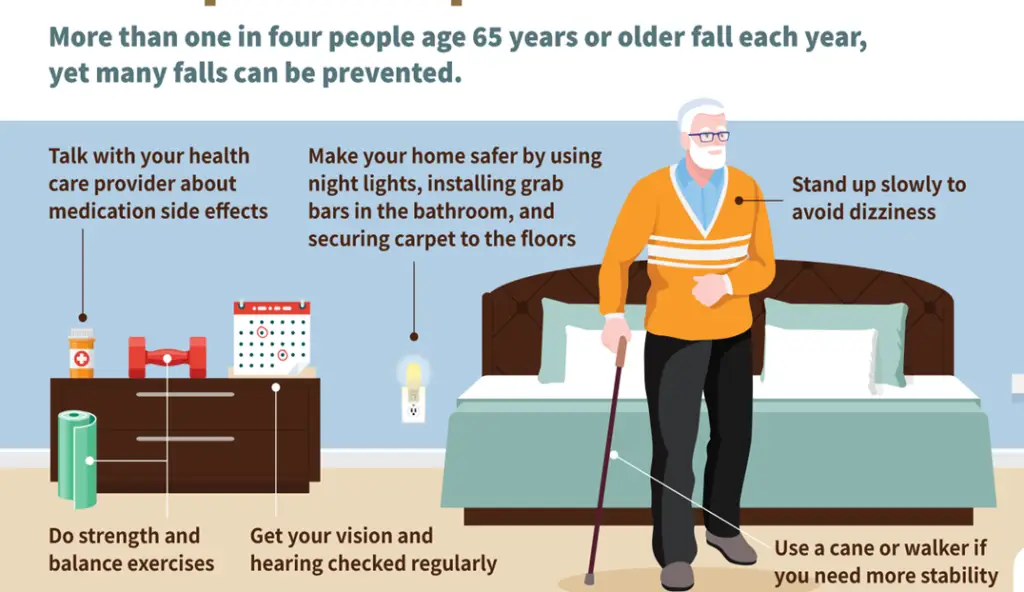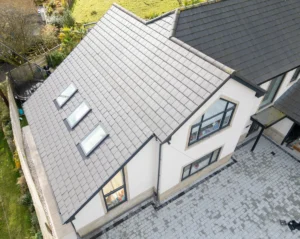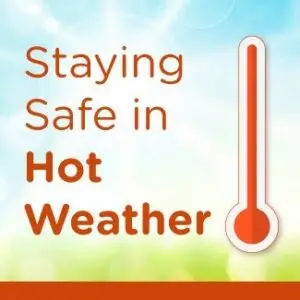12 Ways to Prevent Falls

Nearly a third of people aged 65 and over will fall at least once a year, and as age increases, so does the risk, with around half of the over-80s taking a tumble.
Around 255,000 older people are admitted to hospitals in England every year after falling, and even if bones aren’t broken (most falls don’t result in serious injury), falls destroy confidence, increase isolation and reduce independence
12 Ways to help Prevent Falls
- Be aware of who’s most at risk – older people are more likely to fall because they have balance problems and muscle weakness, poor vision, or a long-term health condition such as heart disease, dementia or low blood pressure.
- Book a medication review every six months with your GP or pharmacist, as some medications can increase the risk of falls due to side-effects.
- Make sure there are bannisters or handrails where needed.
- Buy shoes and slippers with a good fastening and support and a sturdy sole.
- Improve strength and balance by joining local exercise classes or doing other activities – a tailored exercise programme can reduce the risk of falling by up to 50%.
- Use non-slip mats in the bathroom, and consider having a shower seat.
- Mop up spills to prevent slippery floors.
- Get help lifting or moving items that are heavy or difficult to lift.
- Remove clutter.
- Ensure all areas of the home are well lit.
- Have a sight test – It’s estimated that around 30% of visual impairment in people over 75 is the result of wearing the wrong glasses or no glasses at all, which can affect balance and coordination.
- Your GP may recommend you have an electrocardiogram (ECG) and have your blood pressure checked.
What to do if You Fall

The risk of falling increases with age. Falls can be especially dangerous for older adults, often causing fractures, hospitalization, and disability.
The good news is that many falls are avoidable. But what if you do fall. Some common sense tips if you take a tumble
What to do if you Fall
- Keep calm.
- If you’re not hurt, don’t get up quickly. Roll onto your hands and knees and hold on to a stable piece of furniture with both hands. Slowly get up, and then sit down and rest.
- If you’re hurt or unable to get up, try to get someone’s attention by calling for help, banging on the wall or floor, or using an call aid button, If possible, crawl to a telephone and dial 999 for an ambulance.
4. Try to reach something warm to put over you, such as a blanket or dressing gown
Endangered Homes over 2 million

The Centre for Ageing Better and Care & Repair England’s new report reveals that over two million over-55s are living in a home that endangers their health or wellbeing.
The report into non-decent housing in England found that over 4.3 million homes in England don’t meet basic standards of decency, most commonly because of the presence of a serious hazard to their occupants’ health or safety.
More Information
Poor housing can cause or worsen health conditions, reduce a person’s quality of life, exacerbate inequalities and can even result in premature death. Despite this evidence, an estimated 10 million people in England are at risk because they live in a poor-quality home. This is the equivalent of 4.3 million homes, close to half of which are homes lived in by someone over 55 years old and a million with at least one child.
This report uses both previously published and new analysis by the Building Research Establishment (BRE) of the latest English Housing Survey (EHS) data (collected in 2017 and published in 2019). The aim of this report is to provide an overview of housing conditions in England, particularly in the context of population ageing, to inform the policy and practice that relates to ageing well at home.
Beware of the Heat

Too much heat is not safe for anyone. It is even riskier if you are older or have health problems. It is important to be cautious and get relief quickly when you are overheated. Otherwise, you might start to feel sick or risk a heat-related illness that could cause serious health issues.
Why can extreme weather be even more dangerous for older adults than for younger people?
Heat problems to be aware of
Hotter days can cause difficulty in the body’s ability to regulate its temperature. This can be challenging for older adults who typically do not adjust as well as others to sudden temperature changes. Additionally, older adults are more likely to have chronic medical conditions that affect the body’s response to temperature, and to take prescription medicines that alter the body’s ability to control temperature or sweat. Typical heat problems:
- Heat syncope is a sudden dizziness that can happen when you are active in hot weather. If you take a heart medication called a beta blocker or are not acclimated to hot weather, you are even more likely to feel faint. Rest in a cool place, put your legs up, and drink plenty of water to make the dizzy feeling go away.
- Heat cramps are the painful tightening or spasms of muscles in your stomach, arms, or legs. Cramps can result from hard work or intense exercise. Though your body temperature and pulse usually stay normal during heat cramps, your skin may feel moist and cool. Stop the physical activity you’re doing and rest in the shade or in a cool building. Drink plenty of fluids, such as water and sports drinks containing electrolytes. Do not consume alcohol or caffeinated beverages.
- Heat edema is a swelling in your ankles and feet when you get hot. Put your legs up to help reduce swelling. If that doesn’t work fairly quickly, Consult your Doctor.
- Heat rash is a skin irritation from heavy sweating. It causes red clusters of small blisters that look similar to pimples on the skin. Your skin may feel itchy or you may feel “prickly” tingling pain. Keep the infected area dry, use powder to sooth the rash, and stay in cool areas.
- Heat exhaustion is a warning that your body can no longer keep itself cool. You might feel thirsty, dizzy, weak, uncoordinated, and nauseated. You may sweat a lot. Your body temperature may stay normal, but your skin may feel cold and clammy. Some people with heat exhaustion have a rapid pulse. Rest in a cool place and get plenty of fluids. If you don’t feel better soon, get medical care. Be cautious because heat exhaustion can progress to heat stroke.
- Heat stroke is a medical emergency in which the body’s temperature rises above 104°F. Signs of heat stroke are fainting; confusion or acting strangely; not sweating even when it’s hot; dry, flushed skin; strong, rapid pulse; or a slow, weak pulse. When a person has any of these symptoms, they should seek medical help right away and immediately move to a cooler place, such as under shade or indoors. They should also take action to lower their body temperature with cool clothes, a cool bath or shower, and fans.
Join Our Newsletter
Get the Latest news and advice
